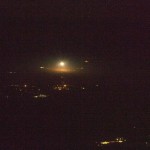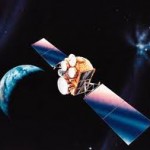 Many of Russia’s tie-ins with the U.S. space program are well known. Yesterday, NASA astronaut Rick Mastracchio posted to Twitter a beautiful photo of a Russian Soyuz launch as seen from the International Space Station. The rocket blasted into space with two Russian cosmonauts and an American astronaut onboard, heading toward the ISS.
Many of Russia’s tie-ins with the U.S. space program are well known. Yesterday, NASA astronaut Rick Mastracchio posted to Twitter a beautiful photo of a Russian Soyuz launch as seen from the International Space Station. The rocket blasted into space with two Russian cosmonauts and an American astronaut onboard, heading toward the ISS.
A lesser-known connection in the military space world is America’s reliance on Russian rocket engines for the Atlas V rocket. When it comes to lofting our country’s most secret satellites into orbit, the Atlas V frequently gets the job. Currently, a National Reconnaissance Office payload aboard an Atlas V is expected to head skyward any day now once technical issues are resolved.
With Russian forces massing along Ukraine’s border and Ukrainian forces departing the Crimea, the strategic implications of using Russian RD-180 engines to launch American spy satellites are being seen in a new light in Washington. It is not a favorable one as Russian and American officials go tit-for-tat with sanctions and other measures intended to punish Moscow’s grab for control of the Crimea.
In a March 25 GlobalPost.com story, a leading space expert warned that if Russia cut off access to RD-180 engine supply, it “would be a blow to our national security.” See the GlobalPost.com article, “How Russia could strangle the U.S. space program.
 Alternatives exist and should be explored with renewed urgency.
Alternatives exist and should be explored with renewed urgency.
Doing so means the Defense Department needs to more deeply embrace competition as well as engage new entrants that can bring the best of our country’s engineering capabilities to the fore. This kind of investment boosts U.S. national security by cutting out Russia from a critical supply role in our industrial base and shores up American competitiveness by investing in domestic R&D.
“When considering the key role that NRO satellites have played in history, this fact is more than simple irony, it’s an undermining of our nation’s security for the sake of the status quo,” American Security Project CEO Steve Cheney said recently in a statement.
find out more: www.NationalSecurityandSpace.org
The post Risk of Russia’s space tie-ins emerge with Crimea crisis appeared first on American Security Project.


